"You can do it!"
When's the last time someone said that to you? In the daily grind, you might not always receive words of motivation from your managers because they get pushed to the wayside as calls and meetings pile up.
So, think of this list as your personal cheerleader. It's ready to help start your day right and make it one you're proud of.
Today, you'll succeed in connecting with that hard-to-reach prospect. Today, you'll close that complex deal. Today, you'll go from being a good manager to a great one.
Today is the day. So, grab your coffee and check out these quotes!
Motivational Quotes of the Day
1. "People often say that motivation doesn't last. Well, neither does bathing -- that's why we recommend it daily." -Zig Ziglar
2. "Someday is not a day of the week." -Denise Brennan-Nelson
3. "Hire character. Train skill." -Peter Schutz
4. "Your time is limited, so don't waste it living someone else's life." -Steve Jobs
5. "Sales are contingent upon the attitude of the salesman -- not the attitude of the prospect." -W. Clement Stone
6. "Everyone lives by selling something." -Robert Louis Stevenson
7. "If you are not taking care of your customer, your competitor will." -Bob Hooey
8. "The golden rule for every businessman is this: Put yourself in your customer's place." -Orison Swett Marden
9. "If you cannot do great things, do small things in a great way." -Napoleon Hill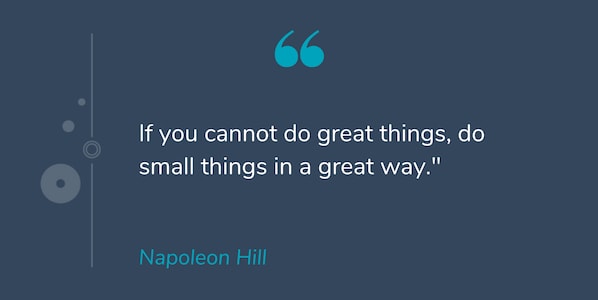

10. "The best leaders are those most interested in surrounding themselves with assistants and associates smarter than they are. They are frank in admitting this and are willing to pay for such talents." -Antos Parrish
11. "Beware of monotony; it's the mother of all the deadly sins." -Edith Wharton
12. "Nothing is really work unless you would rather be doing something else." -J.M. Barrie
13. "Without a customer, you don't have a business -- all you have is a hobby." -Don Peppers
14. "To be most effective in sales today, it's imperative to drop your 'sales' mentality and start working with your prospects as if they've already hired you." -Jill Konrath
15. "Pretend that every single person you meet has a sign around his or her neck that says, 'Make me feel important.' Not only will you succeed in sales, you will succeed in life." -Mary Kay Ash
16. "It's not just about being better. It's about being different. You need to give people a reason to choose your business." -Tom Abbott
17. "Being good in business is the most fascinating kind of art. Making money is art and working is art and good business is the best art." -Andy Warhol
18. "Be patient with yourself. Self-growth is tender; it's holy ground. There's no greater investment." -Stephen Covey
Motivational Quotes for Every Day
Weeks can feel long and bog you down, and it can be tough to stay motivated. We've all been there and sometimes we just need a boost. I've got just the thing for you -- here are quotes for each weekday to keep you going while you work.
Motivational quotes for Monday
Monday is the day to set yourself up for success throughout the entire week. Check out these quotes about initiative to get you started on the right foot.
19. "Without hustle, talent will only carry you so far." -Gary Vaynerchuk
20. "Working hard for something we don't care about is called stressed; working hard for something we love is called passion." -Simon Sinek
21. "I'd rather regret the things I've done than regret the things I haven't done." -Lucille Ball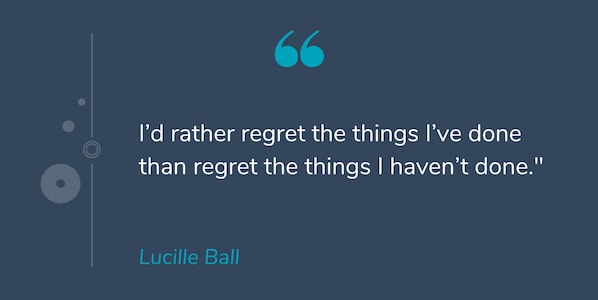

22. "I didn't get there by wishing for it or hoping for it, but by working for it." -Estée Lauder
23. "Always do your best. What you plant now, you will harvest later." -Og Mandino
Motivational quotes for Tuesday
You're in the swing of things now. Here are a few quotes about overcoming challenges for some Tuesday inspiration.
24. "The key to life is accepting challenges. Once someone stops doing this, he's dead." -Bette Davis
25. "Move out of your comfort zone. You can only grow if you are willing to feel awkward and uncomfortable when you try something new." -Brian Tracy
26. "Challenges are what make life interesting and overcoming them is what makes life meaningful." -Joshua J. Marine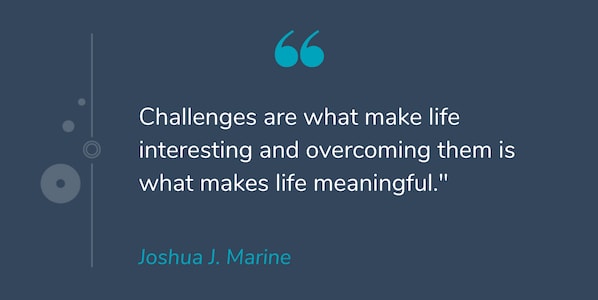

27. "Don't let the fear of losing be greater than the excitement of winning." -Robert Kiyosaki
28. "How dare you settle for less when the world has made it so easy for you to be remarkable?" -Seth Godin
Motivational quotes for Wednesday
Whoa, you're halfway there! Take a look at these quotes about perseverance for the motivation you need to work through the Wednesday afternoon slump.
29. "Energy and persistence conquer all things." -Benjamin Franklin
30. "Perseverance is failing 19 times and succeeding the 20th." -Julie Andrews
31. "Grit is that ‘extra something' that separates the most successful people from the rest. It's the passion, perseverance, and stamina that we must channel in order to stick with our dreams until they become a reality." -Travis Bradberry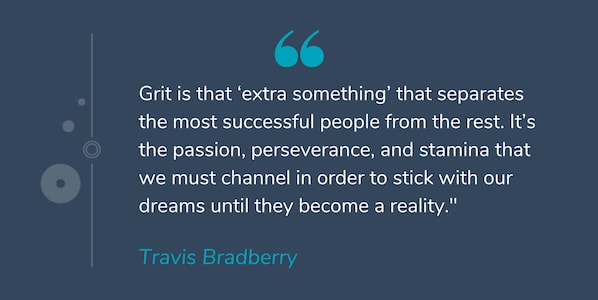

32. "Failure after long perseverance is much grander than never to have a striving good enough to be called a failure." -George Eliot
33. "The secret of joy in work is contained in one word -- excellence. To know how to do something well is to enjoy it." -Pearl Buck
Motivational quotes for Thursday
You're in the final stretch of the week. These quotes about success are sure to power you through until the weekend.
34. "Develop success from failures. Discouragement and failure are two of the surest stepping stones to success." -Dale Carnegie
35. "Action is the foundational key to all success." -Pablo Picasso
36. "The ladder of success is best climbed by stepping on the rungs of opportunity." -Ayn Rand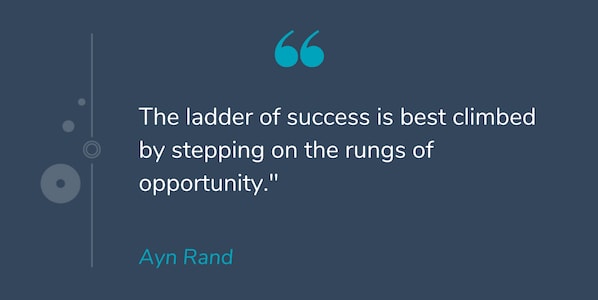

37. "Formula for success: rise early, work hard, strike oil." -J. Paul Getty
38. "The difference between a successful person and others is not a lack of strength, not a lack of knowledge, but rather a lack of will." -Vince Lombardi
Motivational quotes for Friday
It's Friday, or should I say Fri-yay! Pat yourself on the back for the hard work you've put in all week. Here are some determination quotes to help you cross the finish line.
39. "Obstacles are those frightful things you see when you take your eyes off your goal." -Henry Ford
40. "It is your determination and persistence that will make you a successful person." -Kenneth J Hutchins
41. "You can waste your lives drawing lines. Or you can live your life crossing them." -Shonda Rhimes

42. "Determine that the thing can and shall be done, and then we shall find the way." -Abraham Lincoln
43. "Done is better than perfect." -Sheryl Sandberg
Motivational Quotes for Seizing the Day
44. "Don't ask if your dream is crazy, ask if it's crazy enough." -Lena Waithe
45. "The act of doing something un-does the fear." -Shonda Rhimes
46. "Be poor, humble and driven (PhD). Don't be afraid to shift or pivot." -Alex Rodriguez
47. "#1 make good decisions, #2 everything else." -Rand Fishkin
Congratulations! You made it to the weekend.
********
- Doug Myrick






